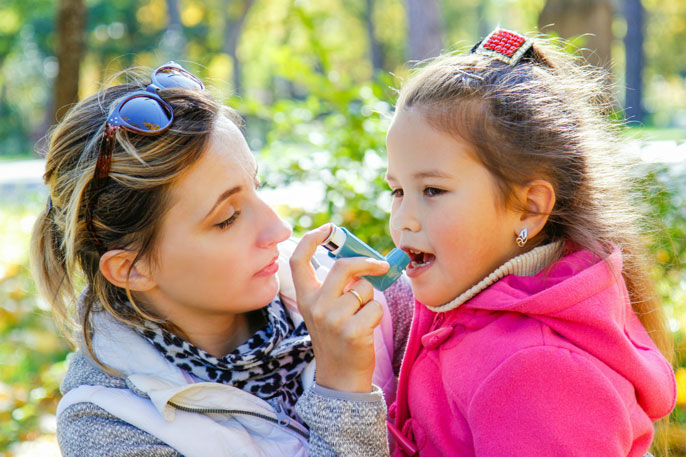Asthma is a chronic disease that affects nearly 9 million children in the United States. When a child with asthma is exposed to any of his/her triggers, his/her lungs and airways can easily get inflamed. This results in asthma symptoms such as shortness of breath, wheezing sound, and chest congestion or tightness.
Asthma in children is no different from asthma experienced by adults. However, children face unique challenges with the disease. It can lead to frequent hospitalizations, emergency room visits, and frequent absences from school.
What causes asthma in children?
An asthma attack can be triggered by several factors including airway infections, allergens (e.g. dust mites, pet dander, mold), irritants (e.g. air pollution, cold air, certain odors), exercise, and stress.
A child is more at risk of asthma if he/she is born prematurely (before 37 weeks), born small for their gestational age, has a secondhand tobacco smoke exposure before or after birth, and has a family history of asthma or allergies.
What are the other symptoms of asthma?
Aside from the difficulty in breathing and wheezing, children suffering from an asthma attack may also show the following symptoms:
- Frequent coughing especially during play or at night
- Less energy during play
- Difficulty falling or staying asleep because of cough or difficulty of breathing
- Retractions in the chest
- Trouble eating or grunting while eating
A simple asthma attack can be so severe, requiring emergency medical help. A child should be seen by a doctor as soon as possible if he/she exhibits any of the following:
- Using the stomach muscles to breathe
- Severe wheezing
- Severe coughing
- Difficulty walking or talking
- Blue nails or fingernails
- Chest pain
- Sweating more than the usual
How is asthma diagnosed?
There are childhood conditions that have similar symptoms to asthma. To diagnose asthma in children, the doctor has to do a physical exam, take your child’s medical history, and run some tests to rule out other conditions.
Some of the tests your child may undergo include lung function and exhaled nitric oxide tests. These tests, however, aren’t accurate for children below 5 years old. For kids younger than that, the doctor will rely on the information you give, such as the child’s symptoms and medical history.
If an asthma attack is triggered by certain allergens, your child’s doctor may recommend doing the allergy skin testing to determine which specific allergen triggers your child’s asthma attack.
Is there a treatment for asthma?
There is no treatment for asthma. However, there are ways to manage the symptoms.
The management plan for the child’s asthma depends on the severity of the symptoms. For children younger than 3 and have mild asthma symptoms, the doctor may take the wait-and-see approach. It’s because the long-term effects of asthma medications in children this young are still yet to be established.
However, for a young child with severe wheezing or asthma symptoms, medication may be prescribed to improve the symptoms.
There are long-term medications that are prescribed to help reduce the inflammation of the child’s airways. These drugs may belong to any of these groups:
Inhaled corticosteroids
Examples of these drugs include fluticasone, mometasone, and beclomethasone.
Leukotriene modifiers
These are oral modifications that can help prevent asthma symptoms for up to 24 hours. This includes montelukast and zileuton.
Combination inhalers
These drugs are a combination of inhaled corticosteroids and a long-acting beta agonist. An example is fluticasone and vilanterol.
Theophylline
These are daily medications that can keep airways open. They are often used with inhaled corticosteroids.
If you suspect your child has asthma, see a doctor immediately. When left unmanaged, asthma can be a life-threatening condition.
Greater Knoxville ENT has specialists who can look into your child’s symptoms and recommend the most appropriate intervention. For appointment requests, you may call us at
(865) 244-4396.

